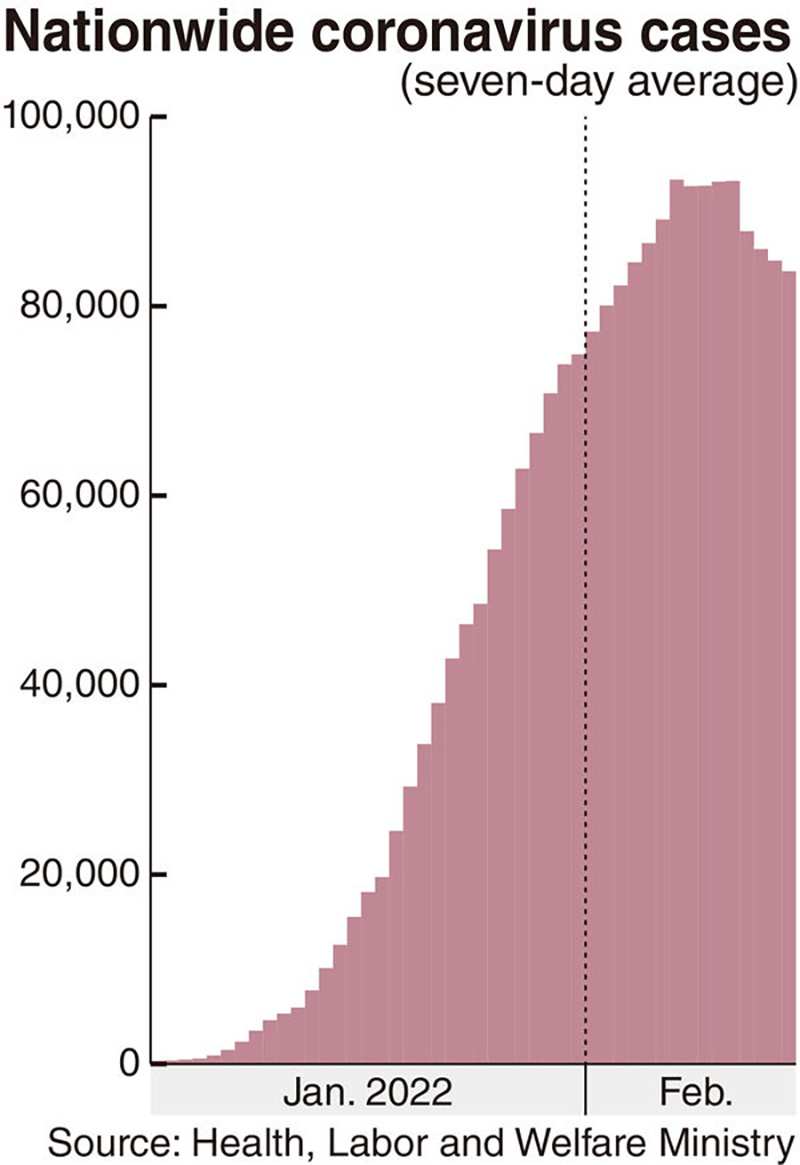
16:51 JST, February 17, 2022
The sixth wave of the novel coronavirus pandemic peaked nationwide in early February, according to an advisory body of the Health, Labor and Welfare Ministry.
The advisory body said Wednesday the number of new cases is decreasing nationwide, marking the first time infections have been on a downward trend since January, when the number of cases surged.
However, the advisory body said the strain on health care services in many areas is likely to continue for the time being because the number of severe cases and COVID-linked deaths is still increasing.
“We believe the number of infections passed its peak nationwide in early February,” Takaji Wakita, director general at the National Institute of Infectious Diseases and chairperson of the advisory body, said Wednesday.
The seven-day average number of cases through Tuesday was 0.9 times the previous week’s figure nationwide, indicating the spread of the virus is decreasing. Last week, the figure was 1.19 times higher than the previous week.
Of the 36 prefectures under quasi-emergency priority measures, 32 reported seven-day averages that were less than 1 times the previous seven-day figure.
The effective reproduction number, or the average number of people infected by a single carrier, was 0.98 on Jan. 31. A figure less than one means cases are starting to decrease. The figure was 1.07 on Jan. 24.
The number of coronavirus cases was on a downward trend for almost all age groups. However, there was a slight increase in cases among people aged 80 and above.
As a result, the numbers of elderly patients and critical care beds in use are likely to continue increasing, according to Wakita. He said it was necessary to establish a system for the rapid administration of oral and intravenous medicines and to accelerate the booster vaccine rollout.
At a meeting of the advisory body on Wednesday, the institute presented a preliminary analysis of the efficacy of booster shots against the omicron coronavirus variant. Vaccine efficacy drops to 53% six months after a second dose, but rises to 81% after a third dose, according to the institute, which advised people to consider getting a booster shot as soon as possible.
The advisory body also pointed out the need for public health centers to operate effectively, as the surge in cases has put pressure on the centers and laboratories, making it difficult to ascertain the status of infected people.
Top Articles in Society
-

Man Infected with Measles Reportedly Dined at Restaurant in Tokyo Station
-

Man Infected with Measles May Have Come in Contact with Many People in Tokyo, Went to Store, Restaurant Around When Symptoms Emerged
-

Woman with Measles Visited Hospital in Tokyo Multiple Times Before Being Diagnosed with Disease
-

Australian Woman Dies After Mishap on Ski Lift in Nagano Prefecture
-

Foreign Snowboarder in Serious Condition After Hanging in Midair from Chairlift in Nagano Prefecture
JN ACCESS RANKING
-

Japan PM Takaichi’s Cabinet Resigns en Masse
-

Japan Institute to Use Domestic Commercial Optical Lattice Clock to Set Japan Standard Time
-

Israeli Ambassador to Japan Speaks about Japan’s Role in the Reconstruction of Gaza
-

Man Infected with Measles Reportedly Dined at Restaurant in Tokyo Station
-

Videos Plagiarized, Reposted with False Subtitles Claiming ‘Ryukyu Belongs to China’; Anti-China False Information Also Posted in Japan





















